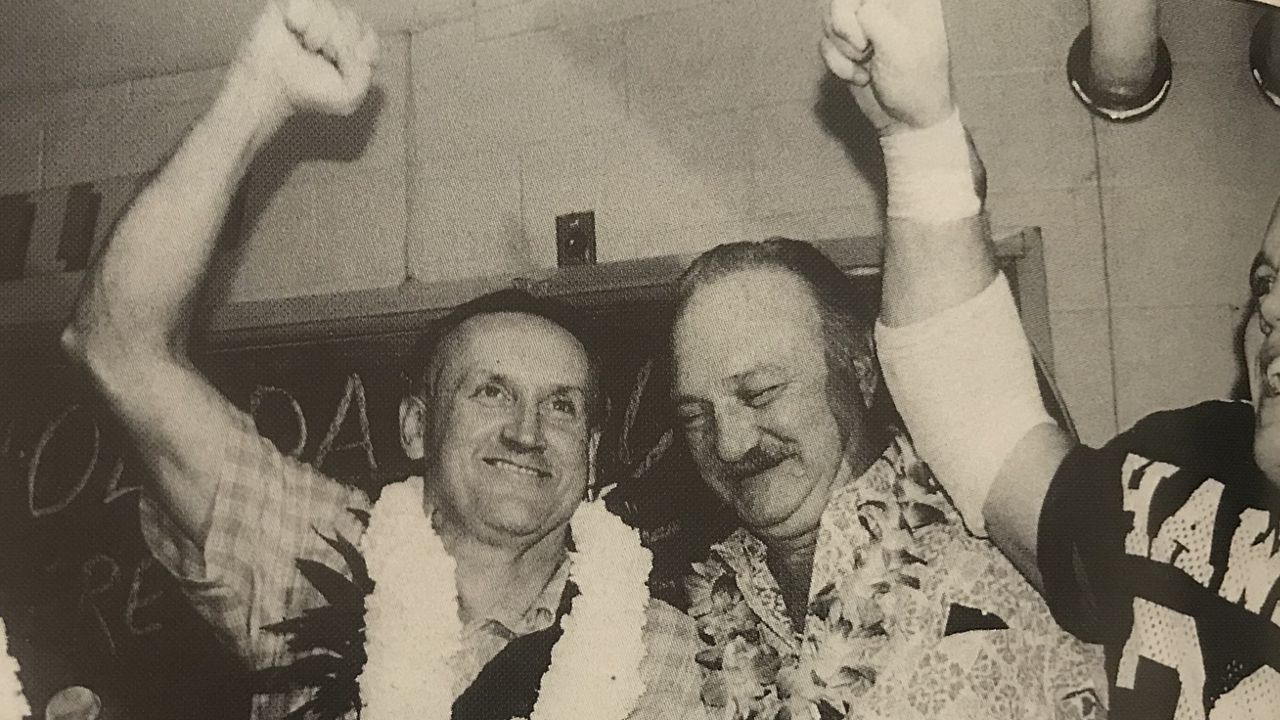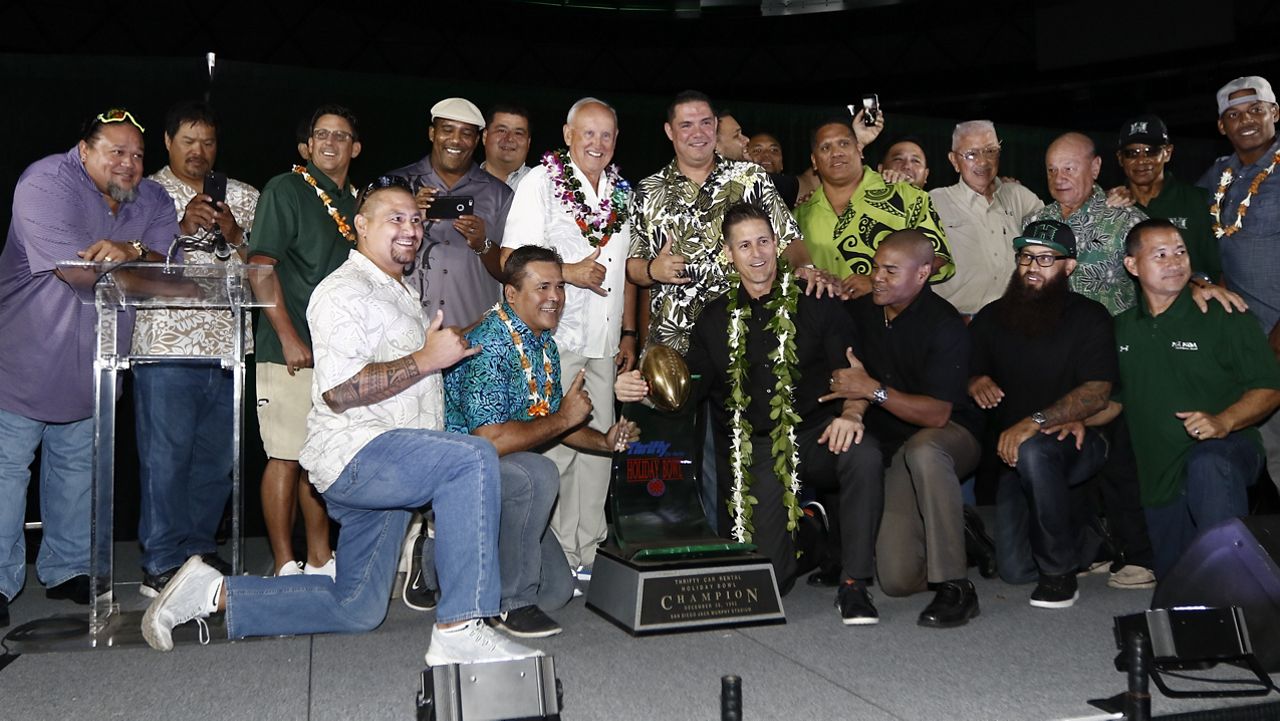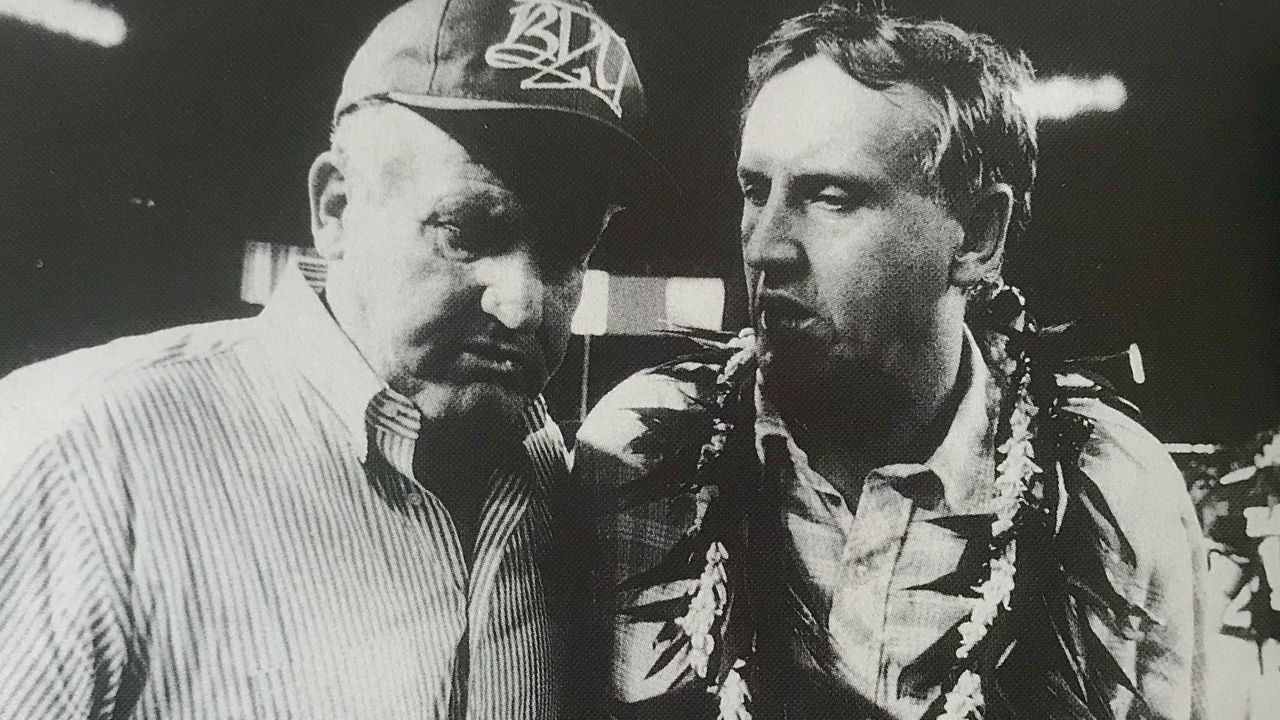Bob Wagner was able to have it both ways.
The Hawaii football coach who blended a Midwestern, blue-collar work ethic with the empathy of the aloha spirit was remembered on Wednesday as a worthy steward of the program at a key point in its history, and someone who changed lives by giving chances to those with few of them.
“In a day and age when it's all about the sizzle, it's all about the swag, Coach Wagner was somebody who really laid a legacy of, if you just do the hard work and do it right, things pay off,” said Victor Santa Cruz, a Wagner recruit and linebacker on UH’s 1992 WAC championship team who became the first member of his family to graduate from college. “And even then, if people don’t appreciate it, you’ve still got your integrity to (fall) back on.”
Wagner had battled health issues in recent days, according to his family. He died on Tuesday night at his home near Waimea on Hawaii Island. He was 76.
Wagner, a native of Newark, Ohio, worked at UH for 19 total seasons, nine as head coach. “Coach Wags,” as he was affectionately known, led the Rainbows to three signature victories over rival Brigham Young, and presided over the program’s first conference title and first two bowl games, including the prestigious 1992 Holiday Bowl in San Diego.
After his collegiate coaching days ended in the early 2000s, he became the first AD at Kamehameha Schools-Hawaii in Keaau. He retired in 2012 but kept close tabs with many of his former UH players in the years since, some as recently as a few weeks ago.
“He’s gotta go down as one of the greatest coaches in Hawaii history,” said Spectrum Sports analyst Rich Miano, a former Rainbows defensive back out of Kaiser High who credits Wagner, his position coach in the early 1980s, for helping him go from a college walk-on to an NFL career. “He ended every day by saying ‘imua,’ (but first) he had to ask what that meant. And once he knew what it meant, that's how we ended practice. That was his chant.
“He really wanted to embrace the local culture, the local kids,” Miano added. And that's why Wags had so much success to me. … It goes back to the commonality of love and respect and appreciation for Hawaii.”
John Veneri, the longtime local television personality and now play-by-play voice for UH football on ESPN Honolulu, was one of those local kids. Veneri, a student at Kamehameha School, planned to go away to a small college to play football before Wagner came calling to have him as a slotback. The exposure that got him set him on a path to discover his eventual media career.
“He affected my life in ways that not too many people have other than my own family,” Veneri said. “I’m going to miss him terribly.”
Their bond grew after his coaching days, Veneri said, and especially after Wagner retired from Kamehameha-Hawaii. Veneri said just a few weeks ago, Wagner joked with him about still expecting royalties for all the impressions Veneri would do of him in the media.
When Wagner’s boss Dick Tomey accepted the Arizona coaching job in 1987, Wagner was chosen as the successor and maintained the same ethos of a hard-hitting defense that stopped the run, and meticulous special teams preparation. He is best remembered for the 11-2 season of 1992 that, until the 2007 Sugar Bowl season, was considered by many the finest campaign in program history. It was capped with a 27-17 win over Illinois in the Holiday Bowl, the program’s first game of such prestige. UH finished ranked No. 20 that year.

He authored resounding wins over despised BYU in 1989 and 1990 and a close win over the Cougars in 1992. He is the only UH coach to have beaten BYU multiple times.
Wagner was 58-49-3 in his nine years in Manoa, third-most in wins after his mentor Tomey (63) and June Jones (76) in the school’s modern era. He was a two-time WAC coach of the year.
What allowed Wagner to succeed, in part, was his talent for staff-building.
“I mean, you look at his coaching staff – (defensive coordinator) Rich Ellerson, (offensive coordinator) Paul Johnson, Buzzy Preston. In the graduate assistant area he had Kenny Niumatalolo, he had Jeff Monken,” Veneri said. “These were all coaches that went on to coach successful programs and some of whom are still coaching.”
But after the unprecedented success of 1992, he went 13-25-1 in his last three years, leading to a moment that is still discussed among the biggest gaffes in UH Athletics history.
After UH’s 4-8 season in 1995, then-Athletic Director Hugh Yoshida fired Wagner at a press conference that Wagner was forced to attend. UH basketball coach Riley Wallace spoke up for Wagner at the presser, leading then-assistant AD Jim Donovan to threaten to make it a 2-for-1 deal.
Wagner was bought out for $200,000, the Honolulu Star-Bulletin reported.
“People around him knew him well enough that he never really did recover from that,” Veneri said. “And he spoke about it kind of often in both joking ways and in conversation. … I think he had a few more years (to coach) at least.”
Fred VonAppen, who would go 5-31 over the next three years, was hired as Wagner’s replacement.
The UH president at the time, Kenneth Mortimer, later expressed regret for the public manner of his dismissal. Wagner had led UH to the only two bowl games in its history to that point.
“I don’t think it was handled well. Bob was embarrassed, and that was not necessary,” Mortimer said in a 2014 oral history project by the UH Social Sciences Research Institute. “I saw him a few years later and I told him that. I just am embarrassed for Bob and that the university fired Bob that way. There was no character issue, there was no integrity issue, there was never any of that.
“The way they arranged it down there was a clumsy kind of thing. I regret that he was put through that kind of public exposure. It wasn’t necessary.”
Despite that, Wagner made it a point to keep ties with the program. When Timmy Chang was hired as the head coach going into the 2022 season, Wagner went to an alumni reunion to support him. In 2017, Wagner and the 1992 Holiday Bowl team were inducted into the UH Sports Circle of Honor.

Miano was not surprised to learn that Wagner spent his final days in the islands.
“That's where his love was,” Miano said.
Santa Cruz, who returned to UH as a defensive staff member under Todd Graham in 2020 and 2021, was devastated when he heard the news of his old coach’s passing on Wednesday. Santa Cruz, too, was an underrecruited prospect.
He remembers Wagner for his unfailing optimism, but also his unwillingness to relax his standards even when it was convenient.
Santa Cruz recalled the time that, at the last practice before the Holiday Bowl at the end of the ‘92 season, Wagner would not let slide a penalty Santa Cruz committed in a scrimmage. The linebacker had to give the coach up-downs as restitution.
“And you know what, I'm better man for it, a better coach for it,” said Santa Cruz, now the head coach at JSerra Catholic in San Juan Capistrano, Calif. “I think I definitely take that away from him and that is that I am not letting the situation decide whether or not to hold the standard up.”
After his UH career, Wagner latched on at Arizona as an inside linebackers coach under Tomey from 1998 to 2000. His final collegiate stint was as a defensive coordinator with UTEP in 2001, a season that brought him back to Aloha Stadium as a visitor.
He was, at least once, a finalist for the UH athletic director position. The job went to Donovan in 2008; Wagner was one of five people interviewed by the UH Board of Regents.
Wagner’s wife Gloria and daughter Christy wrote as part of the announcement of his passing on Wednesday: “As a husband and father, he always took time to celebrate the small, special moments in life that became our family traditions. Admiring beautiful sunsets, listening to the surf, and enjoying our family's favorite desserts together were just a few of them. He loved Hawaii and its people and knew he was loved and admired by family and friends before his passing. He shared in recent days that as a young boy growing up at Newark, Ohio, he never imagined a wonderful life like this.”
Services have not been announced as the family requests privacy.
Brian McInnis covers the state's sports scene for Spectrum News Hawaii. He can be reached at brian.mcinnis@charter.com.



